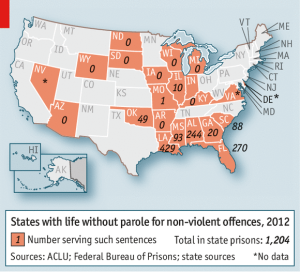Louisiana Leads the Country in Life Without Parole for Non-Violent Offenses
Posted on by Townsend MyersA recent report from the American Civil Liberties Union found that at least 3,278 people are serving sentences of life without parole for non-violent crimes. Around 79% of them were convicted of drug crimes. A hefty 83% of such sentences were mandatory. That is, a state or federal law barred the judge from exercising any discretion, and were triggered by “three-strikes” laws, which demand a severe penalty for a third crime, no matter how minor, if the defendant was previously convicted of two others.
Not surprisingly, Louisiana leads the nation by leaps and bounds. Of the 1200 or so reported state cases of life without parole for non-violent offenses, a startling 429 were in Louisiana. That’s over 33% of the total number of state inmates in the country – in one state!
Prior to 2003 in Louisiana, a third felony offender was compelled to receive life without parole (LWOP) for any felony offense if any of the offender’s previous convictions was for a violent or drug distribution offense. That meant that someone convicted of a non-violent felony like theft or drug possession received a mandatory life sentence if the District Attorney successfully proved that they had at least one prior qualifying felony. In many cases the qualifying violent felony was decades old, but nevertheless mandated life in prison.
Having spent the past 17 years as a criminal defense attorney in Louisiana, I have seen first-hand how application of the old “three strikes” law led to tragic consequences, and have represented many defendant’s who’s lives were quite literally thrown away over convictions for petty offenses. And the ACLU report is replete with examples of policies similar to Louisiana’s working in perverse ways:
- Vincent Winslow was homeless when he acted as a go-between in the sale of two $10 bags of marijuana to an undercover cop. The seller was not arrested. Based on decade old drug possession conviction and unarmed burglaries committed 14 and 24 years earlier, Winslow was sentenced to life without parole.
- Clarence Aaron, a college student with no prior criminal record, was given three life-without-parole sentences for his minor role in two planned large drug deals, one of which never took place. He received longer sentences than his co-conspirators and has spent the past 20 years in prison.
- Lance Saltzman, of Florida, removed a gun from his home that belonged to an abusive stepfather who had used the weapon to threaten his mother repeatedly, he said. He was convicted of armed burglary and, due to a previous burglary conviction when he was 16, sentenced to mandatory life without parole.
- Sylvester Mead earned life without parole for slurring drunken threats at a policeman while handcuffed in a patrol car; he had convictions for battery and burglary six and 16 years previously.
Racial disparities among non-violent convicts serving life are manifest. Among federal prisoners, blacks are 20 times more likely to receive such sentences: they are 65% of the national total, compared with 18% for whites and 16% for Latinos. In Louisiana a shocking 91% of non-violent life-without-parole prisoners are black.
Time Magazine provided the following bullet points from the report:
- The number of U.S. prisoners who received life sentences without parole quadrupled between 1992 and 2012.
- More than 18 percent of nonviolent offenders serving life without parole in the federal system are in for their first offense.
- In the state of Illinois, a black person is 33.25 times more likely than a white person to be sentenced to life without parole for a non-violent crime.
- Black prisoners comprise 91.4 percent of the non-violent life-without-parole population in the state of Louisiana.
- The crimes for which people have been sentenced to life without parole (when combined with prior convictions) include stealing: small change from a parked car, a pair of socks, nine children’s videotapes, a pair of work gloves from a department store, a leaf blower, three golf clubs, chocolate chip cookies and a slice of pizza.
The Economist notes that keeping petty criminals locked up in prisons for life is also expensive. The ACLU estimates that life-without-parole sentences for non-violent offenders costs an additional $1.8 billion over what it would cost to incarcerate the roughly 3300 inmates serving LWOP for non-violent offenses if they had been sentenced without the strict laws. By my calculation, that is an additional $545,000 per inmate – a whopping sum.
In light of the racially disparate results and financial drag, many other states as well as the federal government have started to back off of ultra-tough sentencing laws. Louisiana has eliminated the “mandatory” nature of the LWOP for non-violent offenses, though it is still possible to be given a life sentence here for a minor offense under certain circumstances. Texas has eliminated LWOP for non-violent offenders altogether, and Eric Holder, the United States attorney-general, announced in August that federal prosecutors would no longer charge low-level, non-violent drug offenders with crimes that trigger mandatory life sentences.
The Economist editorial staff had this to say in response to the ACLU report:
“Congress and state legislatures should scrap mandatory sentencing and let judges judge. America should favour shorter sentences coupled with greater efforts to rehabilitate wrongdoers—electronic ankle tags are cheaper and kinder than incarceration. Ideally, more states would join the 20 that have decriminalised marijuana, as a step towards treating addicts instead of punishing them. At the very least, Mr Obama and the state governors should use their clemency powers to reduce the sentences of those now locked up for ever for non-violent crimes.”
I agree with the sentiment and the specific recommendations.












